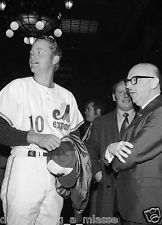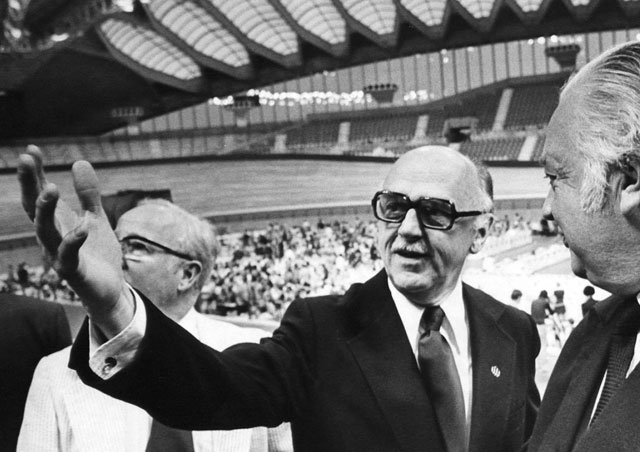Thinking about the impact of the Olympics on host cities reminds me of Frank Deford’s great 1970 Sports Illustrated profile of then-Montreal mayor Jean Drapeau whose unwavering will brought a subway system, a World’s Fair, Major League Baseball and, yes, the Olympics to his city. It should be noted, however, that the construction of the Olympic buildings was bungled horribly and cost overruns left the citizens indebted for three decades. The opening:
“One bright day in the summer of 1970, shortly after Montreal had obtained the 1976 Olympics but in the months just before the city annexed Vermont and then acquired the Vatican to place up on Mont-Royal (the Orange Bowl, after all, seemed so lonely up there with only the Bolshoi Ballet and the Ganges River for company), the mayor of Montreal sat in City Hall and faced down another skeptic. This he does with aplomb, for it is a whole world of skeptics that the mayor endures, and thus he has much practice in the endeavor. The mayor’s working philosophy is: ‘Problems are solved en route,’ and, of course, since Vietnam this is not the most popular mode of operation everywhere. The mayor is not deterred.
Having warmed up at some length, he waves for effect and declares: ‘The Olympics will do even more for Montreal than Expo ’67. Seventy-six is only a target, and we won’t stop. Seventy-six is the means, not the end. Sixty-seven was just taking us into orbit, but the Olympics will take us to the moon [he waves], to Mars! I feel it! I feel it! And I’m not wrong when I feel as strongly as this. There is no challenge too big for Montreal, because, like the Olympics, we are acting with the spirit of Baron de Coubertin, we are acting in a humanistic way. The city possesses an environment, an ambience that can be felt. ‘Montreal is en route to becoming The City of the world. Twenty years from now, no matter what happens, it will have achieved this position, and it will be referred to in all parts of the world as The City.’
Now make no mistake, the mayor of The (incipient) City is a politician. His office is testament to that. There is the portrait of Queen Elizabeth juxtaposed with a crucifix. There are the flowers that adorn the room in bunches, while nestled among them is the mayor’s 125-pound bull mastiff, Due, whose elegiac face does not betray the fact that he could eat for lunch, if he were so disposed, all the flowers, the artifacts and the entire Quebec separatist movement. But if the symbols around the man add up to a balanced display, there is no compromise in the mayor. Charles Bronfman, vice-president of Seagrams, Ltd. and chairman of the baseball Expos, observes: ‘However much he sounds it, the mayor is never a huckster. He is altogether sincere. He has drives that are unusual and dreams that others of us cannot understand.’
 This means that when the mayor says Montreal is going to sprint ahead and leave crossroads like Paris and New York back with Terre Haute, he is not putting you on. He means it. Also, all those enigmatic celestial references to the Olympics are not being emitted just for florid effect. It is worth recalling that at about this same point in the planning stage for Expo ’67, the mayor had already decided to make a permanent exposition of it—though he neglected to let anyone else in on this revelation for some time. Expo ’67 is now Man and His World and is still drawing people to Montreal.
This means that when the mayor says Montreal is going to sprint ahead and leave crossroads like Paris and New York back with Terre Haute, he is not putting you on. He means it. Also, all those enigmatic celestial references to the Olympics are not being emitted just for florid effect. It is worth recalling that at about this same point in the planning stage for Expo ’67, the mayor had already decided to make a permanent exposition of it—though he neglected to let anyone else in on this revelation for some time. Expo ’67 is now Man and His World and is still drawing people to Montreal.
After a certain amount of watching His Honor, one instinctively recalls what Cassius Clay used to say after various correct predictions: ‘If I tell you a fly can pull a plow, hitch him up.’ The mayor brought a world’s fair to Montreal in record time after Moscow reneged on the project. He lured major league baseball into expanding outside the U.S., and happily watched the team prosper and even play well amid predictions of financial and artistic calamity. He took the Olympics away from the U.S. and Russia and left another world power, personified by Charles de Gaulle, put down in a stunning speech after De Gaulle had suggested French Canada might want to, more or less, separate itself from Canada. He built a cultural palace and a subway system in a world where nobody constructs anything that lasts. With a sprinkle of flowers and trees on almost every street, he encouraged a greenhouse of a town to bloom in a place that had been another kind of house for the whole Western world.
The mayor’s name is Jean Drapeau.”

